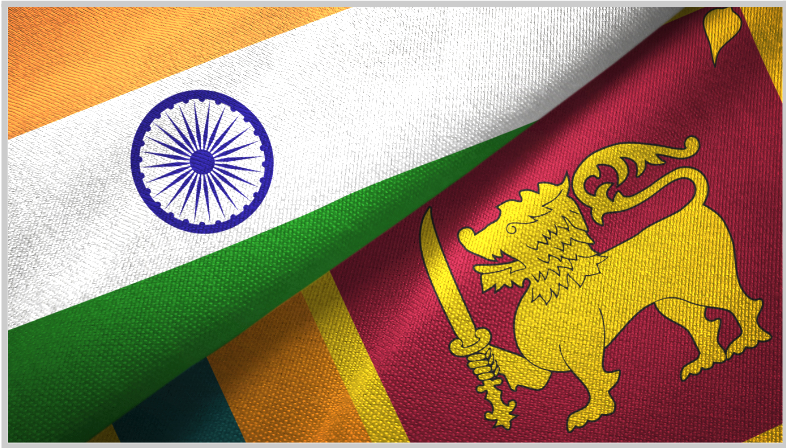Introduction:
Historical Context of Indo-Sri Lankan Relations:
1. Cultural Affinities: Shared Buddhist heritage and Tamil cultural connections.
2. Colonial Legacy: Post-independence, both countries faced similar challenges of nation-building.
3. Security Concerns: India’s involvement during the Sri Lankan Civil War, particularly through the Indian Peace Keeping Force (IPKF), and its support for Tamil reconciliation efforts have shaped bilateral ties.
Over time, the relationship has evolved to focus on mutual economic development, maritime security, and countering regional threats.
Sri Lanka’s Strategic Importance for India:
1. Geopolitical Significance:
• Located near vital sea lanes, Sri Lanka is a hub for international shipping connecting Europe, the Middle East, and Southeast Asia.
• Proximity to India’s southern coast makes developments in Sri Lanka directly impact India’s maritime security.
2. Ports of Strategic Interest:
• Colombo Port: A key transshipment hub for Indian trade.
• Trincomalee Port: One of the finest natural harbors in the world, strategically significant for naval operations.
• Hambantota Port: Developed with Chinese assistance, it has raised concerns due to its potential strategic use beyond commercial purposes.
3. Ethnic and Cultural Ties:
• Tamil Nadu and Sri Lanka’s northern provinces share linguistic, familial, and cultural bonds, making Tamil reconciliation a crucial aspect of bilateral relations.
4. Role in the Indian Ocean Region:
• As great power rivalries intensify, Sri Lanka’s role in the IOR is pivotal for maintaining a balance of power.
• The country’s stance influences the security and stability of the region.
1. External Influences:
• China’s Growing Presence: Investments under the Belt and Road Initiative (BRI), including the Hambantota Port lease, have increased Chinese influence in Sri Lanka.
• Concerns over Chinese naval vessels docking at Sri Lankan ports have heightened India’s apprehensions about potential strategic encirclement.
2. Economic Vulnerabilities:
• Sri Lanka’s financial crisis has made it reliant on international assistance, opening avenues for influence by external powers.
• Debt dependency, particularly on China, is a concern for India, as it could indirectly impact regional stability.
3. Maritime Security Risks:
• The misuse of Sri Lankan territory for surveillance or military purposes could jeopardize India’s coastal security.
• Threats from drug trafficking and illegal fishing in the shared maritime boundary add to security challenges.
India’s Efforts to Safeguard Its Interests:
1. Defense and Maritime Cooperation:
• Joint Exercises: Initiatives like SLINEX (Sri Lanka-India Naval Exercise) enhance interoperability and maritime security.
• Infrastructure Support: India has provided patrol vessels and radar systems to strengthen Sri Lanka’s maritime domain awareness.
2. Economic Assistance:
• During Sri Lanka’s economic crisis, India extended $5 billion in aid, including credit lines and essential commodities, reinforcing goodwill.
• Developmental projects such as housing schemes, energy collaboration, and connectivity initiatives reflect India’s commitment to Sri Lanka’s growth.
3. Diplomatic Engagements:
• Mechanisms like the Colombo Security Conclave provide a platform for regional dialogue on issues such as counter-terrorism and maritime threats.
• Regular high-level visits and bilateral agreements ensure alignment on strategic priorities.
4. Support for Tamil Reconciliation:
• India advocates for the implementation of the 13th Amendment to the Sri Lankan Constitution, which seeks devolution of powers to Tamil-majority provinces.
• It continues to emphasize inclusive governance as a path to long-term stability.
5. Technology and Capacity Building:
• Collaboration on projects like the Sri Lanka Unique Digital Identity (SLUDI) system fosters technological integration and governance improvements.
• Training programs for Sri Lankan defense and civil service personnel deepen institutional ties.
Strategic Implications for India:
1. Geopolitical Balance:
• Maintaining Sri Lanka’s neutrality is critical to countering external influence, particularly in the IOR.
• Enhanced engagement with Sri Lanka can deter adversarial forces from gaining strategic leverage.
2. Maritime Security:
• Securing Sri Lanka’s ports from misuse aligns with India’s broader maritime strategy of ensuring freedom of navigation in the IOR.
• Collaborative efforts in areas like underwater surveillance and anti-piracy operations will strengthen regional security frameworks.
3. Regional Cooperation:
• Sri Lanka’s active participation in multilateral platforms like the BIMSTEC (Bay of Bengal Initiative for Multi-Sectoral Technical and Economic Cooperation) enhances collective security and economic integration.
• Building an inclusive Indo-Pacific strategy with Sri Lanka as a key partner can foster long-term peace and prosperity.
The Way Forward:
1. Expanding Economic Engagement:
• Promote joint ventures in infrastructure, renewable energy, and digital technology to deepen interdependence.
• Support Sri Lanka’s economic recovery through capacity-building programs and market access.
2. Strengthening Maritime Cooperation:
• Establish joint mechanisms for monitoring maritime activities and sharing intelligence in real time.
• Collaborate on the development of Sri Lanka’s smaller ports to reduce reliance on external powers.
3. Fostering People-to-People Ties:
• Enhance cultural exchanges and academic collaborations to build goodwill.
• Facilitate travel and trade between Tamil Nadu and Sri Lanka to reinforce ethnic and cultural bonds.
4. Institutionalizing Security Dialogues:
• Create a high-level strategic dialogue mechanism to address bilateral and regional security issues proactively.
Conclusion:
Sri Lanka’s strategic importance for India transcends geography, encompassing economic, cultural, and security dimensions. The assurance by Sri Lanka’s leadership to prevent anti-India activities on its soil reflects a shared vision for regional stability. For India, continued engagement with Sri Lanka is crucial to addressing mutual concerns and leveraging opportunities in the Indian Ocean Region. By adopting a balanced approach that integrates economic, security and cultural dimensions, India can ensure that Sri Lanka remains a steadfast partner in its pursuit of regional peace and prosperity.
|
Main question:
|







